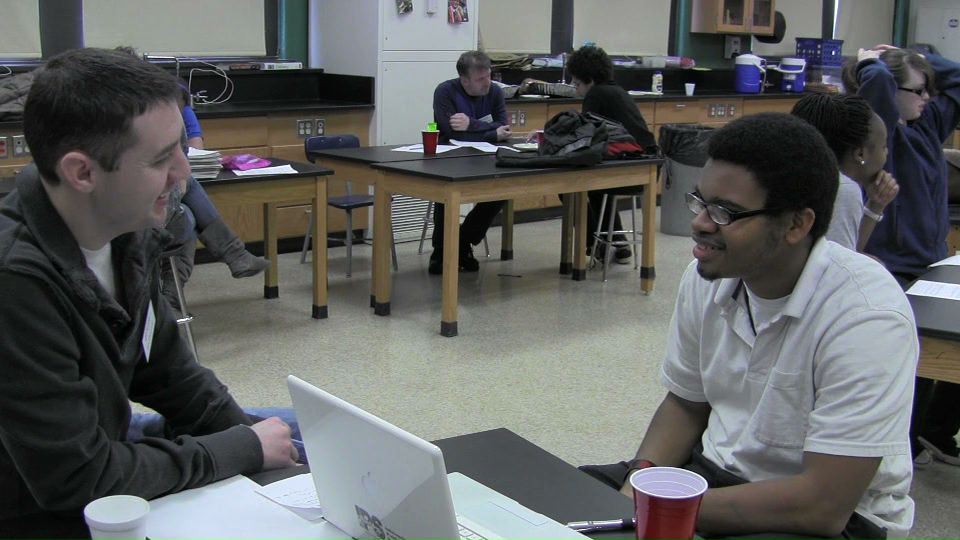YOUNG POETS SPEAK OUT
Butler freshman Evie Schultz recently penned a terrific feature about the Butler Writers program and our upcoming Butler ArtsFest performance on Saturday, April 20. We love Evie’s article and appreciate the time she spent at Shortridge hanging out with Exclusive Ink, so I’ve excerpted the full text from Sky Blue Window. To view the original publication, which features a great spread that includes photos and student poems, click here. Thanks again, Evie.
Eric Williams sits on a chair in Room 238 in Shortridge Magnet High School, typing out rhymes on his iPhone, which is where he stores all his poems. Williams loves to write about anything, everything. These moments, when he’s jotting down ideas for new poems or performing his work in front of his peers, are his favorite part of the week. Poetry has provided a way for Williams to express himself through words and channel his emotions into written form.
The 16-year-old participates in Writing in the Schools, a cooperative effort between Shortridge and Butler University’s Creative Writing MFA program. Every Tuesday and Thursday after school, Room 238 becomes a place for Williams and other Shortridge students to tell their own stories.
Now these students will be sharing these stories with a much larger audience, at a performance titled “Outspoken” at Butler on April 20 at 1 p.m. The performance, which will be held at Eidson-Duckwall Recital Hall, was coordinated by Susan Sutherlin, an English instructor and director of peer tutoring at Butler, and is a part of the university’s ArtsFest.
ArtsFest’s theme, Revolution, will be incorporated into the students’ work as they interpret what the word means to them.
The program itself has been revolutionary for some students. Williams joined Writing in the Schools at its conception, two years ago. He says when he first began attending, he was in a dark place because of some bad relationships, and his poetry reflected this.
“But the people in this program really learned to love me and care about me, so progressively [my poems] just got more and more brighter and more and more uplifting,” he said. “You can say they changed my perspective on life.”
Paula Cloyd, 16, had the same experience. “I’ve suffered from chronic depression, so obviously things haven’t been easy,” she said. “[Writing in the Schools has] given me something to look forward to.”
“To give these kids a forum to perform stuff that is meaningful to them and then to have their peers cheering for them, clapping for them…. I think the confidence boost is just amazing for some of these kids.”
Not only has the program been a way for the students to grow more confident, it has also given these young writers the opportunity to express their feelings on topics they know personally, such as love, heartbreak, family troubles and school.
“Being a teenager doesn’t mean all your issues are petty,” Cloyd said. “Like, you can have real stuff that some adults don’t even go through. I don’t like the whole, ‘Oh, you’re young, or you’re this, or you’re that, so you don’t know anything.'”
The students performing at the event are ready to show audiences that though they are young, they can understand and write about an important idea such as revolution. Williams is excited to show audiences his interpretation of the topic.
“I want them to leave and be like, ‘Wow, he’s just a 16-year-old kid, but he’s saying something deeper than other people might say,'” he said. “It gives them a different outlook on inner-city kids like myself.”
Zuri Palmer, 16, said the theme of revolution will be apparent in her performance. “I’m really trying to hit the idea of change,” she said. “Revolution is just being in a place and having something change and you’re coming out of it. It doesn’t have to be in the best shape, but you’re coming out of it.”
The students and their instructors say Writing in the Schools has allowed them to grow and change, becoming revolutions themselves.
“I think these kids even coming here Tuesdays and Thursdays to see us is a revolution,” graduate assistant Doug Manuel said. “They could be anywhere, doing anything, and deciding to care about words, and to care about poetry, and to care about searching within themselves, two days is a week is more than many people do. To be engaged with the inner workings of the self is a revolution. A small one, of course, but it seems like all the revolutions that matter are small.”

